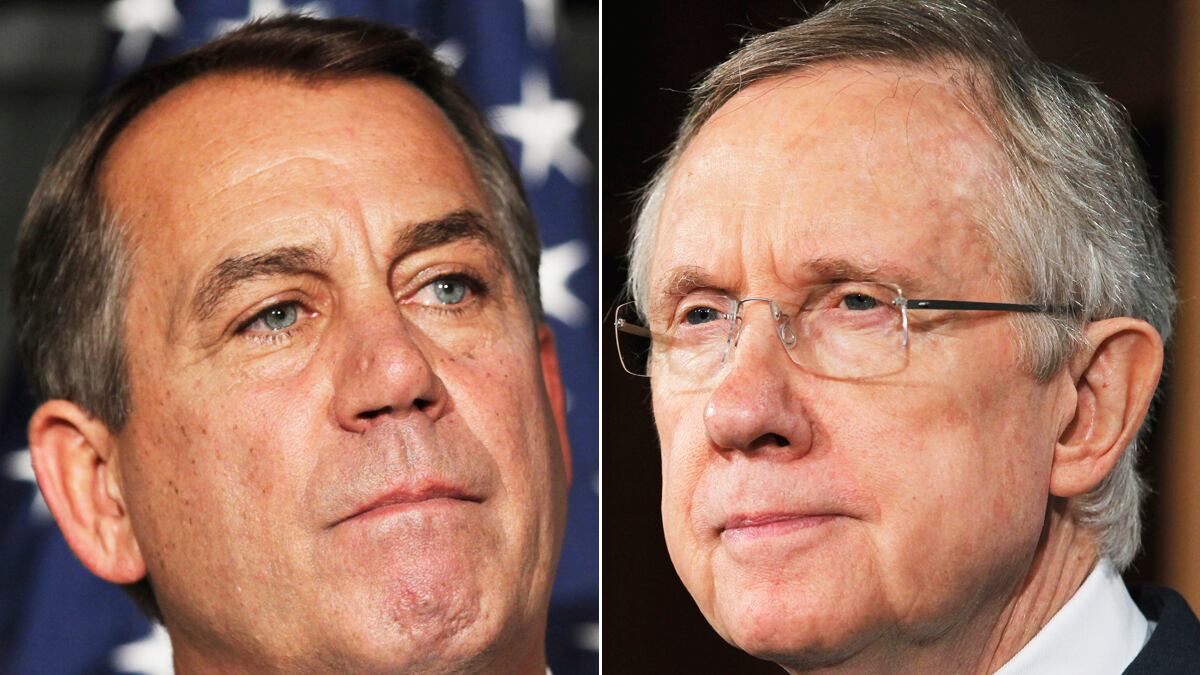As White House and congressional leaders race toward the Aug. 2 deadline for default, a new plan is emerging on Capitol Hill that may end the debt crisis this weekend.
A trigger option is being discussed by senior members of Congress as a way to bridge the divides between two controversial plans making their way through the House and the Senate, according to several lawmakers and staffers from both parties.
House Speaker John Boehner’s proposal is expected to pass the House today after he and the Republican leadership twisted the arms of Tea Party freshman who had opposed any compromise plan in order to hold out for bigger cuts.
But Senate Majority Leader Harry Reid has declared Boehner’s plan “dead on arrival” and trying to round up 60 votes to pass his own proposal. Several estimates by members suggest that Reid has either 55 or 56, several shy of a filibuster-proof majority.
As scored by the nonpartisan Congressional Budget Office, both plans are very similar. Both immediately make about $1 trillion over the next decade with a plan for $1.5 trillion more in cuts identified later by a bipartisan debt committee. Neither includes revenues or any tax increases that the White House and some Democrats had aggressively pushed during much of the debate but surrendered earlier this week.
The main difference between both proposals is how long a debt-ceiling extension would last. Reid and the Democrats, including President Obama, have sought to extend U.S. borrowing authority through 2013. Boehner and the Republicans have said such an arrangement would be giving the president a “blank check” during election season and have pushed instead for an extension until the end of 2011.

The compromise plan with the trigger would likely extend the ceiling until Jaunary 2013 and include the $1 trillion in immediate cuts for the next decade. Congress and the bipartisan committee would be charged with identifying the other $1.5 trillion by the end of this year. The trigger would include draconian cuts and potentially even revenue increases unpalatable to both parties if no second round of cuts was agreed upon by December, thus giving both parties incentive to negotiate the painful details.
“It’s one of the options that we’re discussing,” a member of Congress close to the negotiations told The Daily Beast, noting the details of cuts and the trigger had not yet been discussed. The White House had no comment on the prospect, although President Obama has spent much of the past week advocating for some sort of compromise between the parties.
Triggers have been somewhat effective in the past. Ronald Reagan signed the Gramm-Rudman-Hollings Balanced Budget Act in 1984, which included automatic spending cuts unless specific deficit reduction targets were met. With that hammer hanging over their heads, Congress spent some time making strategic cuts. But by 1990, when it became clear Congress would fall short on a full package, George H.W. Bush started new negotiations and signed a bill that, among other things, broke his no-new-taxes vow.
State legislatures have also used the idea for issues ranging from outlawing abortion if the Supreme Court overturned the Roe v. Wade decision to rejecting the Electoral College if the federal government ever amended the nation’s rules for electing a president. Some cities have recently discussed the idea for school districts, instituting intense disciplinary measures—including firing principals or a number of teachers--if specific performance targets aren’t met.
Congress also discussed a trigger in 2009 and 2010 during the health care debate. Months before the final bill was signed, Democrats floated a compromise plan that would have that included some reforms with a trigger that if key concerns weren’t addressed—including reducing the number of people uninsured and bringing down Medicare costs—the law would automatically create a public health insurance option. But Republicans, along with some Democrats, opposed the idea, not wanting to be boxed in a corner.
Now the idea has been resurrected as a way out of the partisan impasse that has brought the country to the brink of default.
UPDATE, 5:40 PM: As jockeying continued on Thursday, several Republican sources in the Senate told Newsweek and The Daily Beast that a trigger mechanism was gaining significant traction in the upper chamber as the final compromise solution. Despite similarities between the two existing measures, House Speaker John Boehner’s bill simply would not muster enough votes in the Senate, a senior Republican aide said, and Majority Leader Harry Reid’s bill couldn’t earn the votes of critical House Republican freshman. Senior senators are discussing the possibility of finalizing the trigger compromise on Friday and passing it through the Senate and House over the weekend, when both chambers will be in session.






